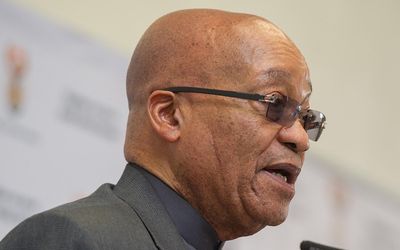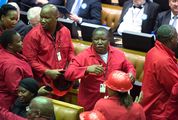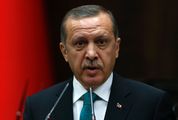THE key question in our national debate seems to be shifting from whether President Jacob Zuma should go, to who should succeed him when he does.
In my previous column, I suggested the issue appeared to have boiled down to a choice between Deputy President Cyril Ramaphosa and Zuma’s former wife, Nkosazana Dlamini-Zuma.
But now the name of Kgalema Motlanthe has resurfaced, apparently favoured by the Gauteng branch of the African National Congress (ANC).
It is an intriguing development, for three years ago, Motlanthe ran against Zuma for the ANC presidency. Had the ANC voted for him then, he would have been president of the country now and we wouldn’t be in the mess we find ourselves.
By the time that choice was made, Zuma had already revealed his incompetence and his corruption, while Motlanthe had shown himself capable of healing the country as stand-in president after the clumsy recalling of former president Thabo Mbeki.
Yet the ANC delegates in Mangaung rejected the proven good leader and chose the one who had already revealed his weaknesses.
So what does that tell us about the judgment of the ANC as a body, and particularly of its leading figures who are supposed to offer wisdom and guidance?
I think it indicates that the party is prone to manipulation by power brokers who use promises of desirable positions in government to faction leaders if they support a particular candidate.
This is a game at which Zuma, as a former chief of ANC intelligence, is a master.
It is how he has put together the patronage system we have. Which is why we have an administration that places loyalty before competence. Which is the reason for our economic and political decline.
I am raising this today because I think it is important for the people of this country — and particularly the analysts and commentators — to realise that recalling Zuma as president would not in itself be enough to get us out of the hole he has dug us into.
Recalling Zuma is certainly essential, and the sooner the better. But replacing him with a new Number One, however competent, would not be a silver bullet to fix everything. Yes, a new president might at least stop digging that hole deeper as Zuma keeps doing, and would certainly send a signal of hope to investors at home and abroad.
But seven years of Zuma has done too much structural damage to our institutions to allow for any quick-fix.
A major restructuring job will await our next president, and it will be a delicate and politically difficult job.
The political cronies who are obstructing development because of their incompetence and indifference will have to be weeded out and replaced by people who can do the job efficiently.
We have competent people aplenty in our society, but they have been kept out of the important jobs, because they haven’t been part of the patronage game.
It has been a game of cronyism, and it has infected a large part of our public service. Dismantling that will be a tricky political task and will take time.
It is important for all our people to appreciate that, because we don’t want another crisis of expectations such as afflicted this country after the Nelson Mandela era.
It is important, too, that ANC branch members should bear this in mind when it comes to choosing their replacement leader. They should take greater note than they did last time of the huge responsibility they bear when they make that decision.
The people of SA don’t elect their president; members of the ANC alone do that, for it is the dominant party at this time.
It may not stay that way much longer, as a new era of coalition governments may begin at local government level this year, but it is going to remain the case at national level for at least the next three years, and our country is in desperate need of healing.
So, let us hope that ANC members will exercise a greater sense of responsibility than they did when they gave us Zuma.
This time the question in every party member’s mind should be, not whether it is time to have a woman at the helm, nor which faction or ethnic group should claim the number one spot this time, but rather which individual is best qualified to lead us out of the mess in which Zuma has landed us.
Who has the leadership qualities to reunite us as a nation? Who has a sound enough understanding of economics to get us back on a growth path to stop unemployment escalating? Who is capable of putting the national interest ahead of factional and personal interests?
Moreover, I suggest that our combined economic, political and social crises have become so serious that whoever emerges as our post-Zuma president should consider declaring a state of economic emergency and forming a government of national unity to mobilise all sectors of society to get the country up and running again. Our Constitution allows for this.
A new president could invite any opposition members of the National Assembly, as well as two from civil society, to join his Cabinet — plus two deputy ministers from outside the assembly.
That could provide a broad representation of political groups, as well as some key specialists, such as business and technology, in a Cabinet that could still be half the size of our current grand army of mediocrity. Surely, it is something worth considering.
• I have a feeling the full story of the Gupta family’s role in SA is about to burst into the open, and that it could well be a political game-changer.
I was particularly intrigued by an article in last Friday’s Business Day, in which Financial Times journalist Andrew England quoted Ajay Gupta, eldest of the three brothers, as saying the family "maybe" gave "a very small loan" to Duduzane Zuma (the president’s son) in the form of vendor financing to make him a black economic empowerment partner in their business operations.
Vendor financing is when someone lends you money to buy something from them.
So, is this how Duduzane acquired 28.5% of Tegeta Exploration and Resources, which then acquired the loss-making Optimum coal mine after the state mining authorities allegedly used threats of regulatory action to pressure the previous owner, Glencore, into selling it to them?
True or false, such stories have a way of coming fully into the open sooner or later.
Mr Zuma is due to appear in Parliament for question time on Thursday. Opposition members are sure to bombard him with questions about the Gupta connection.
I wonder whether he’ll answer them — or even pitch up?
• Sparks is a former editor of the Rand Daily Mail

Recalling Jacob Zuma is certainly essential, and the sooner the better
THE key question in our national debate seems to be shifting from whether President Jacob Zuma should go, to who should succeed him when he does.
In my previous column, I suggested the issue appeared to have boiled down to a choice between Deputy President Cyril Ramaphosa and Zuma’s former wife, Nkosazana Dlamini-Zuma.
But now the name of Kgalema Motlanthe has resurfaced, apparently favoured by the Gauteng branch of the African National Congress (ANC).
It is an intriguing development, for three years ago, Motlanthe ran against Zuma for the ANC presidency. Had the ANC voted for him then, he would have been president of the country now and we wouldn’t be in the mess we find ourselves.
By the time that choice was made, Zuma had already revealed his incompetence and his corruption, while Motlanthe had shown himself capable of healing the country as stand-in president after the clumsy recalling of former president Thabo Mbeki.
Yet the ANC delegates in Mangaung rejected the proven good leader and chose the one who had already revealed his weaknesses.
So what does that tell us about the judgment of the ANC as a body, and particularly of its leading figures who are supposed to offer wisdom and guidance?
I think it indicates that the party is prone to manipulation by power brokers who use promises of desirable positions in government to faction leaders if they support a particular candidate.
This is a game at which Zuma, as a former chief of ANC intelligence, is a master.
It is how he has put together the patronage system we have. Which is why we have an administration that places loyalty before competence. Which is the reason for our economic and political decline.
I am raising this today because I think it is important for the people of this country — and particularly the analysts and commentators — to realise that recalling Zuma as president would not in itself be enough to get us out of the hole he has dug us into.
Recalling Zuma is certainly essential, and the sooner the better. But replacing him with a new Number One, however competent, would not be a silver bullet to fix everything. Yes, a new president might at least stop digging that hole deeper as Zuma keeps doing, and would certainly send a signal of hope to investors at home and abroad.
But seven years of Zuma has done too much structural damage to our institutions to allow for any quick-fix.
A major restructuring job will await our next president, and it will be a delicate and politically difficult job.
The political cronies who are obstructing development because of their incompetence and indifference will have to be weeded out and replaced by people who can do the job efficiently.
We have competent people aplenty in our society, but they have been kept out of the important jobs, because they haven’t been part of the patronage game.
It has been a game of cronyism, and it has infected a large part of our public service. Dismantling that will be a tricky political task and will take time.
It is important for all our people to appreciate that, because we don’t want another crisis of expectations such as afflicted this country after the Nelson Mandela era.
It is important, too, that ANC branch members should bear this in mind when it comes to choosing their replacement leader. They should take greater note than they did last time of the huge responsibility they bear when they make that decision.
The people of SA don’t elect their president; members of the ANC alone do that, for it is the dominant party at this time.
It may not stay that way much longer, as a new era of coalition governments may begin at local government level this year, but it is going to remain the case at national level for at least the next three years, and our country is in desperate need of healing.
So, let us hope that ANC members will exercise a greater sense of responsibility than they did when they gave us Zuma.
This time the question in every party member’s mind should be, not whether it is time to have a woman at the helm, nor which faction or ethnic group should claim the number one spot this time, but rather which individual is best qualified to lead us out of the mess in which Zuma has landed us.
Who has the leadership qualities to reunite us as a nation? Who has a sound enough understanding of economics to get us back on a growth path to stop unemployment escalating? Who is capable of putting the national interest ahead of factional and personal interests?
Moreover, I suggest that our combined economic, political and social crises have become so serious that whoever emerges as our post-Zuma president should consider declaring a state of economic emergency and forming a government of national unity to mobilise all sectors of society to get the country up and running again. Our Constitution allows for this.
A new president could invite any opposition members of the National Assembly, as well as two from civil society, to join his Cabinet — plus two deputy ministers from outside the assembly.
That could provide a broad representation of political groups, as well as some key specialists, such as business and technology, in a Cabinet that could still be half the size of our current grand army of mediocrity. Surely, it is something worth considering.
• I have a feeling the full story of the Gupta family’s role in SA is about to burst into the open, and that it could well be a political game-changer.
I was particularly intrigued by an article in last Friday’s Business Day, in which Financial Times journalist Andrew England quoted Ajay Gupta, eldest of the three brothers, as saying the family "maybe" gave "a very small loan" to Duduzane Zuma (the president’s son) in the form of vendor financing to make him a black economic empowerment partner in their business operations.
Vendor financing is when someone lends you money to buy something from them.
So, is this how Duduzane acquired 28.5% of Tegeta Exploration and Resources, which then acquired the loss-making Optimum coal mine after the state mining authorities allegedly used threats of regulatory action to pressure the previous owner, Glencore, into selling it to them?
True or false, such stories have a way of coming fully into the open sooner or later.
Mr Zuma is due to appear in Parliament for question time on Thursday. Opposition members are sure to bombard him with questions about the Gupta connection.
I wonder whether he’ll answer them — or even pitch up?
• Sparks is a former editor of the Rand Daily Mail





















Change: 1.19%
Change: 1.36%
Change: 2.19%
Change: 1.49%
Change: -0.77%
Data supplied by Profile Data
Change: -0.19%
Change: 0.69%
Change: 1.19%
Change: 0.00%
Change: 0.44%
Data supplied by Profile Data
Change: 0.62%
Change: 0.61%
Change: 0.23%
Change: 0.52%
Change: 0.12%
Data supplied by Profile Data
Change: -0.21%
Change: -1.22%
Change: -0.69%
Change: -0.51%
Change: 0.07%
Data supplied by Profile Data